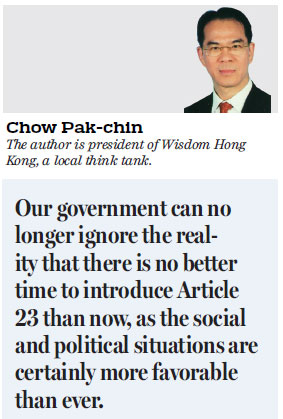Enactment of national security law in the SAR has been long overdue
Updated: 2018-11-26 07:24
By Chow Pak-chin(HK Edition)
|
|||||||
Hong Kong is the only city in China that does not have any national security legislation, and this is exposing our city to sovereignty and national security risks.
The enactment of a national security law under Article 23 has been long overdue since Hong Kong's return to China in 1997. Understandably, the Special Administrative Region is under increasing pressure to introduce the relevant legislation, as it is constitutionally obliged to do so under the Basic Law.
According to the Basic Law, the Hong Kong Special Administrative Region "shall enact laws on its own to prohibit any act of treason, secession, sedition, subversion against the Central People's Government, or theft of state secrets, to prohibit foreign political organizations or bodies from conducting political activities in the region, and to prohibit political organizations or bodies of the region from establishing ties with foreign political organizations or bodies."
Existing laws do not provide the protection that Article 23 requires. At present, only treason, secession, sedition, subversion against the Central People's Government, and theft of state secrets are covered. None of them prohibit foreign political organizations from conducting subversive political activities, nor do they stop local political organizations or bodies from establishing ties with foreign political entities.

The drafters of the Basic Law and the National People's Congress that passed it obviously saw the gap. Article 23 of the Basic Law exists for a good reason. We must complete the set of local legislation and keep out unfavorable foreign political entities. And now is the opportune moment to do so.
Many will recall that the attempt to legislate under Article 23 in 2003 came to an end when a massive demonstration on July 1 took to the streets against the provisional bill to introduce the legislation in question.
Back then, the public was clearly misled and rattled by anti-government propaganda. A massive fear and scaremongering campaign went on for weeks. In the early years of the Special Administrative Region, many in Hong Kong feared for the loss of human rights, as well as freedom of expression and assembly.
Now, 15 years on, Hong Kong residents have learned the lessons of not having the national security law. They witnessed how law and order were thrown into a shocking state of disarray with illegal "Occupy Central" protests, the Mong Kok riot, and the swathes of illegal and disorderly demonstrations across the city.
Thankfully, the pendulum has swung back. Many have finally come to realize the necessity of upholding national security, as well as the urgency of implementing Article 23 legislation.
Meanwhile, we must be aware of new attempts to mislead such as those made recently by Johannes Chan Man-mun, professor of law and former dean of the Faculty of Law of the University of Hong Kong, who claims that existing laws are sufficient to safeguard national security. Do not for one moment be fooled by those who are trying to pull the wool over our eyes. The simple fact of the matter is that all existing legislations put together do not cover the full scope of Article 23.
Interestingly, when Chan was called out by former chief executive Leung Chun-ying to specify how existing laws can also cover the prohibition of political activities by foreign forces, he did not respond. Nor has he responded to enquiries by media outlets that oppose Article 23 legislation, Apple Daily included.
Our government can no longer ignore the reality that there is no better time to introduce Article 23 than now, as the social and political situations are certainly more favorable than ever.
Now is the time for true political and decisive leadership, because any more delays in completing the legislative process to uphold our national security will only expose Hong Kong to risks such as calls for independence, or acts that undermine China's sovereignty, security and development.
Today is the day to act, not tomorrow.
(HK Edition 11/26/2018 page8)